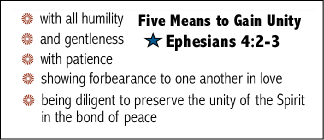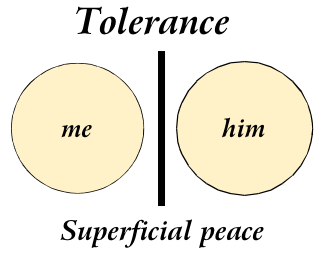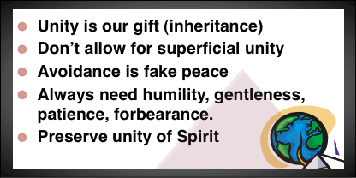 |
|
|
Intro: Problem of Disunity | A) Our Calling to Unity (Ephesians 4:1) | B) Our Oneness of the Body (Ephesians 4:2-3)
C) The Preservation of Unity (Ephesians 4:3) | | Bible Study Questions (Ephesians 4:1-3) D) The Doctrine of Unity (Ephesians 4:4-6) | One God & Father (Ephesians 4:6) | Bible Study Questions (Ephesians 4:4-6) |
B) The Oneness of the Body (Ephesians 4:2-3)
With all humility and gentleness, with patience, showing forbearance to one another in love, being diligent to preserve the unity of the Spirit in the bond of peace” (Ephesians 4:1-3).
 Ephesians 4:1 speaks about what the Lord has given to us in Christ: our calling. He not only reminds us of this calling but entreats us to live according to this vision of what God has given to us. This describes what Paul reminds us to. There is often, a desperate cry in our hearts, “How?”
Ephesians 4:1 speaks about what the Lord has given to us in Christ: our calling. He not only reminds us of this calling but entreats us to live according to this vision of what God has given to us. This describes what Paul reminds us to. There is often, a desperate cry in our hearts, “How?”
This is what Paul begins to address here in Ephesians 4:2-3. In these two verses Paul lists 5 things we are to pay attention to in order to carry out this vision of oneness with the Lord and others. They speak of ways we are to conduct ourselves with other believers: humble, gentle, patient, forbearance and diligent to preserve the unity of the Spirit. When we live out our lives in this manner, others can live around us much more easily.
Just think about the difference between having a patient or impatient wife. A patient wife is not demanding but understanding. On the other hand, think what it is like to have a humble or prideful husband who always thinks he is right. The same is true in the church. The way we live with each other enables us to obtain those rich blessings that the Lord has given to us. When we do not live in this manner, sins crop up and Satan enters. Division, isolation, offensive words and unforgiving attitudes quickly develop. God’s way is always the best way.
The Lord has been teaching me more about this topic lately. Even though I have experienced some wonderful situations in the past, I have also had my share of strained relationships, misunderstandings, quick judgment and unforgiving spirit. Sometimes I am on the receiving side, but to be true, sometimes I have taken part in that critical side. Through this passage the Lord has given me a renewed energy to live out this unity despite the challenges I face.


The first four character qualities are essential to carrying out this mission. We need to constantly work on growing in these areas. Jesus was this way and wants us to let Him live His life through us. If our style of being a husband, wife, parent, leader, etc. is not characterized by these things, then we need to change our approach to life or our problems will only worsen.
“With all humility” highlights the need to recognize the importance of those others including those who are somewhat hostile toward us. This doesn’t mean that we as individuals have no value, but instead calls us to keep the right perspective of others and not be confused by the inflated value of ourselves over others. Our old nature just naturally has us think more of ourselves as more important than others. This is the enemy of love. A good test of our humility is to ask, “Do you see the need for others?” Humbling ourselves is an active step of thinking properly about oneself in the overall context of life.
“And gentleness” focuses on the kind way that we respond to people that we differ with. It is easy to respond nice to nice people, but when we meet a grump, it is easy to be grumpy back. Yesterday morning I had a run in with a local cashier. I was in line to buy some milk, but she was just looking down and doodling. The cashier next to me was busy with one person and then another. I finally asked whether my cashier would help me complete the purchase of the milk. She told me she was closed but her window had no indication of that. So I had to get at behind the person at the other register. I was tempted not to be gentle. Her rudeness and unwillingness to provide general courtesies shocked me. I had to tame myself down to speak gently. I hope I did!
“With patience” reminds us that we cannot insist everyone live trying to maximum our own time efficiency. That is great for ambulances but not for us. We need patience. Patience is that special ‘art’ of getting excited to help others be efficient in what they are doing even to our own detriment. When we are patient, we will not so easily blow up or react against others. Instead, it allows us to exude a kind spirit in disruptive situations.
“Showing forbearance to one another in love” emphasizes the need to actually forgive one another. Patience does not mean someone has wronged you, but forbearance contains this idea - something wrong is being done to you. The word literally means “to suffer.” In other words, we are called here to put up with the the improper behavior of others. This might come in the form of cursing, laziness, stealing or just plain selfishness. We need to show forbearance to all through the power of His love. We are to be forgiving as He has forgiven us.
A Focus on # FIVE
I want to focus on the fifth item, “Being diligent to preserve the unity of the Spirit in the bond of peace.” All of these attributes are important, but the last is not as easily understood. I have been troubled for a long time on what Paul means by 'preserve the unity of the Spirit.' Maybe you have too. Each time I read that verse, one word stood out like a sore thumb. It stood out because it didn’t fit. That is, in my mind it didn’t smoothly read but made me wonder about its meaning.
What word is it then that makes this verse difficult to understand? “Being diligent to preserve the unity of the Spirit in the bond of peace” (Ephesians 4:3).
My biggest difficulty in understanding Ephesians 4:3 has been the word ‘preserve (NASB)’ or ‘keep’ (NIV). Once I mention it, you probably understand my problem. Our experience does not ring true with the command to preserve unity. We would be more than happy to rewrite the verse to fit our experiences. I think it would be better to write, “Being diligent to make the unity of the Spirit in the bond of peace.” Words like make, create, form or plan would all work. But words that imply the unity is already present seem to counter our life experience. The longer one lives, the more one finds this is true. For now, however, we will leave this topic and return to it shortly.
Before going more into what this ‘preserve’ means and how this practically works out in our lives, let us first introduce the other concepts given in the last phrase of verse 3.
Diligent
The word ‘diligence’ speaks about a persistent attitude in which one tackles some problem. If we want to get ahead in school, we are not to lag behind. Nor are we to be like the sporadic individuals who only comes alive for an important test. Instead, we work regularly, diligently, perseveringly in order to accomplish some certain task. We exert ourselves so that we can get that job done. I understand this. When I train my child some certain task, I need to be constantly alert to his or her needs and demands. The mission to train the child makes the focus on the child more important than most other things. The word we most often use for diligence today is consistency. Diligence calls us to arise above our own personal preferences and to avoid distractions because something else stands as a life priority.
Unity
The word ‘unity’ only has meaning when more than one is present. A unity can occur when people have the same mindset. They think the same about some certain matter. Of course, no one thinks absolutely the same. We were made with differences, including the different ways male and females approach life. Unity refers to a joint mind or approach despite the differences. Let’s look at a few examples.
We have a negative example of this unity when people built the Tower of Babel. “And the LORD said, “Behold, they are one people, and they all have the same language. And this is what they began to do, and now nothing which they purpose to do will be impossible for them” (Genesis 11:6). When they persisted after one goal, they could accomplish amazing things. So much so that God destroyed this unity by giving them different language mediums and dividing them.
For more BFF reading on this topic:
Unity & Diversity on Genesis 10-11
Tower of Babel & World Languages: Unity from Genesis 11:1-9
We see a positive example when the people of God unite in prayer to God.
“And they were continually devoting themselves to the apostles’ teaching and to fellowship, to the breaking of bread and to prayer. And everyone kept feeling a sense of awe; and many wonders and signs were taking place through the apostles. And all those who had believed were together, and had all things in common; and they began selling their property and possessions, and were sharing them with all, as anyone might have need” (Acts 2:42-45).
Again, we see them functioning as one. This kind of unity was exactly what God desired: people centering their lives around Him. The ‘Bowtie Unity’ diagram below describes God’s response to these different kinds of unity. On the one hand when people concur to do evil, such as in Sodom, we find judgment. On the other hand, when God’s people are with one heart and mind seeking God’s will, we discover God’s great blessing upon them like in the early church. The more the unity, that is, the more people with a similar mindset (seen in the wide ends of the bowtie going to far left or right), whether for bad or good, brings about an intensified response from God: judgment for the wicked and blessing for the obedient.

People believe that they are more familiar with the concept of unity than they really are. When God designed marriage, He no doubt was thinking of the beauty of unity. The ‘two shall become one.’ Otherwise, why design a lifelong relationship where there are arguments, infighting, bitterness and competition?
The same with the family. The father is the head of the home. The parents are responsible for their children. When God’s design for respect toward the parents is not met, the family can become an awful place to live. Some of you, perhaps, only know how to treat your parents disrespectfully. You might even think that this is normal or cool. You are in fact fighting against God’s good ways. Marriage and family were to function as a unity.
Note God’s advice for Hagar after she has become prideful and despised Sarai her mistress. “Then the angel of the LORD said to her, “Return to your mistress, and submit yourself to her authority” (Genesis 16:9). Find your place in the home and humbly live it out even if it goes against your feelings. Things will settle down later. Work toward unity and blessing will be found (Psalm 133).
The church is also to be a unity. This is, of course, the point of this scripture portion. Unity describes how brothers and sisters function as one. But again, we find that this seems to be more of a theory or doctrine than something that is put in practice. Christians are unfortunately better at pretending unity than actually possessing it. To be brief, we have been cheated. Our marriages, families, and churches should possess the fruit of unity but often don’t. An example of this is certain cult-like denominations which so emphasize their own Christian community and their inherent unity, they treat other brothers and sisters outside of the community of the Lord. The Lord Himself told us that we were not to tear the tares out early. Preserving the unity of the body stands at a higher priority than purity.
Unity of the Spirit
We need to recognize that the unity that we are searching for is a unity from the Spirit of God. Unity can be bad when the ungodly act in opposition to God. I would actually not use the word unity to describe the similar mindset of the wicked but obviously there is some element of unity. Let me describe it through an illustration.
Once I was invited to this government banquet. There was to be a speech, but it seemed that most people were interested in the free food. When the food buffet opened, there was a dash to get to the table. One would have thought that they have not been fed for a long time, but by their size one could tell that this was not the case. They all dashed in one direction - towards the tables. Was this unity? Sort of. But it definitely was not the unity of the Spirit. How do I know? There was no consideration of one another. One had to be careful not to be trodden down by others.
What happens in such situations is that each individual follows his own appetite. As long as they each get their portion, they are happy. But if there is any threat to them missing out a bit on the free food, watch out. Contention develops. Their sense of unity is framed around their hope and willingness to use others to get what they so desperately want. It is the individual greed in each person like a compass that makes them work together. It is a superficial unity. The world might seem to function as a unity in some respects, but they have their selfish desires propelling them.
The unity of the Spirit is quite different. Have you experienced this kind of unity? We read about it earlier when those early Christians were actually selling their property to care for everyone in need. This picture is quite different than the world. They made sacrifices to help others. Ephesians 4:4, the very next verse, states “There is one body and one Spirit.” When He is working in each individual, each individual is seeking to accomplish His purpose. The unity then comes when we all focus on His will and purpose. This requires, of course, each individual to submit his own will to the Lord. When this is done, the Spirit can and will mightily work.
Application
Have you ever prayed for renewal? Have you ever sung a song about revival? When we do, we are basically asking God to remove those things that keep God’s people from being filled with the Spirit. When a few people are moved by God, it is easier to be touched by the work of the Holy Spirit in our own lives. This is what we all need to yearn for even if it takes our whole being. The good thing is that we largely need to focus on our own individual lives. We do not need to demand change in others. As the song “Cleanse Me (Search me O God)” goes, ‘Send a revival, start the work in me.’
The bond of peace
“Preserve the unity of the Spirit in the bond of peace” (Ephesians 4:1-3).
A bond or glue keeps things together. Ligaments keep the body’s bones functioning together. A string bound around some magazines will keep them tied together. In this verse, we see it is peace which binds the hearts of individuals together. Paul says it is agape love that keeps unity. “And beyond all these things put on love, which is the perfect bond of unity” (Colossians 3:14). Unity does not initiate love but love the unity.
Peace is a commonly used word but not very often well understood. Peace has two meanings. It refers to inward peace–tranquility, or the peace between individuals–harmony. Maybe it would be best to understand this by thinking of the opposite of peace. Disharmony, restlessness, agitation, conflict and irritation that describe the loss of peace. If we do not have peace in our hearts, it is hard to have peace with others. Many people move house, job, church and mate just to find peace. Temporary circumstances seem to solve the problem for a while, but once those relationships grow then so do the problems. The problem is with the people and their relationships with others rather than the situation.
We need the Spirit of God to give us this peace of heart which then provides peace with those about us. James clearly identifies why there is loss of peace.

“But if you have bitter jealousy and selfish ambition in your heart, do not be arrogant and so lie against the truth. This wisdom is not that which comes down from above, but is earthly, natural, demonic. For where jealousy and selfish ambition exist, there is disorder and every evil thing. But the wisdom from above is first pure, then peaceable, gentle, reasonable, full of mercy and good fruits, unwavering, without hypocrisy. And the seed whose fruit is righteousness is sown in peace by those who make peace” (James 3:14-18).
We need to subdue that selfish and greedy heart if we are going to find that peace. Peace is not just something acquired so that we can sleep well, but it shapes our relationship with God and others too. Peace itself, Paul says, is a glue of sorts. It enables people to work with others even though they have differences.
Do you have peace in your life? How would you describe your relationships with others? Do you sense friction? Is there peace? There is no doubt that we cannot always solve every relationship but, more than likely, we can live at peace with most people.
“If possible, so far as it depends on you, be at peace with all men.” (Romans 12:18).
“So then let us pursue the things which make for peace and the building up of one another” (Romans 14:19).
I have had to learn how to live at peace with all sorts of people. As a missionary, I met many non-Christians and worked with many Christians. As a pastor, I have had to get involved in the details of people’s lives. As a husband, I have had to see what it means to live at peace with my wife. As a Dad, I have had to learn what it is to preserve the unity of the Spirit with my family. Sometimes I did better than at others. Where I have had insight, humility and boldness, I have reaped peace. At other times, I ducked and avoided. I allowed a lack of confrontation to stand for unity or peace. All that brought was longstanding tension.
Although there might be the lack of outward conflict, there can still be the inner tension. I tended to endure misunderstandings rather than with a prayerful heart go and carefully clear them up. I have tried to work on some situations, but at other times I have just let it go. In these cases, I can see that I did not keep the unity of the Spirit. I only was trying to preserve the status quo. Let me give you some illustrations.
A husband knows something is wrong. His wife has hinted at a couple of things she is concerned about. He doesn’t like her not so subtle reminders and simply ignores them. Should the husband just ignore his wife? If he is typical, he doesn’t do a good job understanding her needs. He thinks it is better to let her deal with the trouble rather than getting involved. But in this case, he could solve the problem!
The parents know their child has a problem. Maybe he is watching too much television, writing too much IM or watching things that they disapprove of. Tension is arising. The parents have tried to curtail his involvement in these things but to no avail. What should they do? Just ignore the problem? Is this what Paul is suggesting? You just want a quiet house. Is a quiet house a peaceful home? Definitely not. One can walk away from a relationship or commitment, but the lack of peace still resides deep in one’s heart. Parents must pursue clear standards and discipline challenges to respect.
What if there are differences in the church? Maybe you differ with a small group leader or another on how he or she does something. Does Paul mean that you should be quiet and not say anything? Or if there is disagreement in Biblical instruction or teaching, should we always be quiet? Is this what Paul means by preserving the peace? I don’t think so. We have a greater purpose of working closely together. Pretend unity is not unity. We need to get to the point where we are committed to each other despite the differences.
I hope by now that you can recognize that a show of outward unity is not unity, not the least the unity of the Spirit. There is no peace here. It is a beginning. But it also can be a disguise that that keeps true unity from every being reached. We should not allow the absence of outward conflict to define the peace that God wants to give to us. We hope there is no outburst of anger and shouting matches. This is clearly unacceptable. We need, however, to penetrate the surface and go deeper to hold onto the great things that the Lord has for us. Allow me to summarize two important reminders before going on.
Peace is not the absence of outward conflict.
Peace is not just tolerating those that you don’t get along with. A godly peace is forbearing but this is different than a simple tolerance of another. The world’s tolerance allows for shallow relationships. There is strain in the relationship because of some offense. A person is angry with another. On the surface it looks great but below there is no harmony.
Forbearance allows for difference or even offense.
Forgiveness brings a healing power that overcomes offenses. The tolerance of the world allows one to harbor differences, but the Spirit’s forbearance brings forgiveness and healing so that the individuals really care for each other. If you do not value each other, then you know there is a problem. We are not just looking for the absence of conflict but inwardly the success of others. Things are right when you go out of your way to help others reach that success.
Now let’s explore one of the most confusing concepts in this verse. Next =>
 Most of BFF articles such as this one is nicely formatted for printing. This article also has a Powerpoint. Check out the great number of articles on the BFF Biblical Training Library all at one low cost. |
'Overcoming Anxiety: Finding Peace; Discovering God' seminar!
Finding Peace in terrible times
Oneness in Marriage - Genesis 2:18-25
One Great Team: Dad & Mom
Read more exciting and practical articles on the Book of Ephesians.
Introduction to the Book of EphesiansPaul's Second Missonary Journey to Ephesus - Map Ephesians 1Ephesians 1:1-3 Every Spiritual BlessingEphesians 1:1-3 Every Spiritual Blessing Ephesians 2Ephesians 2:1-3 Our Need, His GraceEphesians 2:1-3, an Introduction Ephesians 3Ephesians 3:1-10 Growing in Our Commitment Ephesians 3:20-21 God's Unlimited Power |
Ephesians 4Ephesians 4:1-6 Preserving the Spirit's UnityIntroduction: Problems of Disunity Ephesians 4:11-16 The Purpose of TrainingEphesians 4:11-13: A) God's Word in the Church Ephesians 4:14 B) Responsibility 1. Deceit Ephesians 4:11-14 Chart: Equipping of the Saints Ephesians 5-6Ephesians 5:22,24 Wives be Subject to your Husband |
BFF Homepage | Top | Back | BFF Topics | Ephesians 4:1-3 Study questions | Next =>
Biblical Foundations for Freedom
Paul J. Bucknell
NASB Bible used
